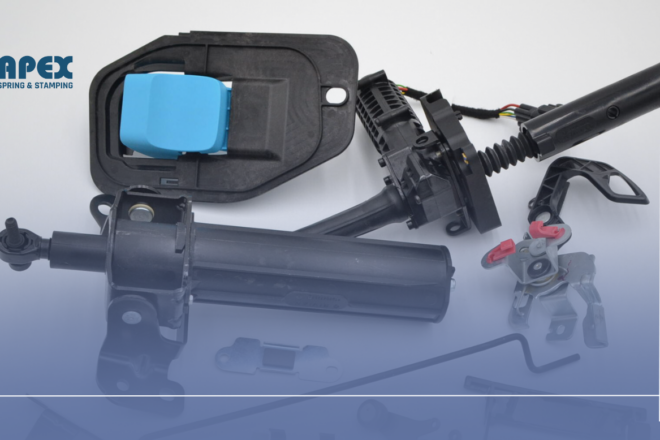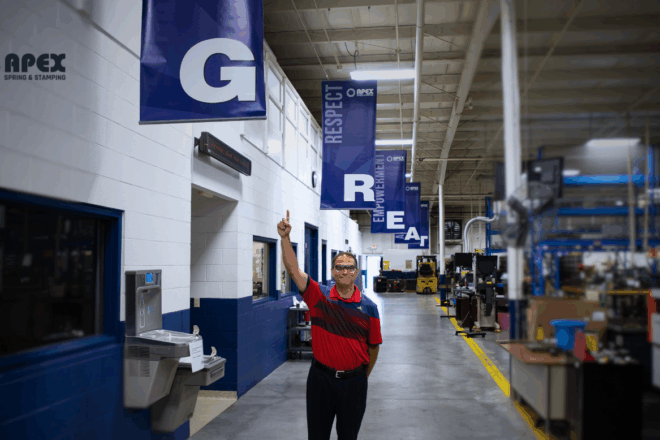There is no doubt that working with local businesses has benefits in every industry. This includes great benefits to working with local manufacturing. We’d like to dig into those benefits so you can continue to make informed decisions for your business. So, for the sake of this discussion, let’s clarify what we mean by local sourcing and offshoring. Local sourcing refers to using suppliers and manufacturers in your immediate area or even companies simply located in the United States. Offshoring is the concept of using manufacturers outside of the United States. Offshoring versus local sourcing has been debated for a long time. And rightly so because options in manufacturing are endless! But we think the real success of offshoring is debatable. Many times manufacturers using offshore sources have experienced problems in communication, flexibility, quality, costs, and more. This has led some companies to realizing the value of local manufacturing outweighs that of going offshore!
The Shift To Offshore
Many factors are considered when choosing a manufacturing partner. It could include the size of a business, its relationship with companies in their area, turn around time, costs, and more. These same factors also contribute to a company ultimately choosing to go offshore for manufacturing needs.
Without getting too far into the weeds, it’s important to note that offshoring primarily became popular due to lower costs for labor, lower tariffs, less governmental restrictions, and the lower cost of resources. Because of these and other factors the concept grew quickly and we saw many companies making the decision to work with manufacturers outside of the United States. But making such a huge shift doesn’t come without costs. Companies that offshore often experience difficult communication, problems with the supply chain, decreased quality, unexpected costs, and the uncertainty of relations with governments and workers. Not yet mentioned are the negative effects on the communities and companies here in the United States. So let’s take a closer look at the challenges of offshoring and then dive into why local manufacturing carries great benefits.
Offshoring Challenges
Supply Chain
The supply chain is arguably one of the most important elements of manufacturing. Therefore, when resources move away from local companies, the more difficult it is to maintain a supply chain that can be controlled and adjusted to meet the ever-changing needs of modern manufacturing. Turnaround times, efficient production, and smooth relations with suppliers and producers require a close connection so that changes can happen immediately or within an acceptable time frame. Offshoring can put a very real strain on the supply chain.
Unexpected Costs
Although it was clear at the beginning of the offshore movement that there would be expenses that would add to the cost of products, the feeling was that the overall savings would outweigh any new expenses. But numerous factors drive costs and they can add up quickly. For instance, relying on labor forces in other countries does have unplanned implications. Sometimes traditions and customs of a country that, in many cases, varied radically from those of the United States which can lead to delays and unexpected costs. Another overlooked factor is tariffs (taxes on imported goods.) Manufacturers must pay taxes on all goods coming into the United States and these tariffs can be significant, and can fluctuate and change. Manufacturing companies have worked hard to make adjustments for these costs over the years, but frustrations and inefficiencies are still always present.
Strained Relationships
When dealing with a company in a different country, time zone, culture, and economy, it can create a strain that isn’t anticipated. For example, hours of operation can be very different from one country to another, providing a very small window during the day to connect with the offshore company. Also language and cultural barriers can post struggle when trying to collaborate and communicate. What you know to be ethical and good business here in the US is often different in other countries. All of these factors can make it difficult to work with offshore companies.
Shifting Back Onshore
Because of these struggles (and more), we have started to see a shift back to choosing onshore partners. Some actually see a decrease in costs. Many also see an improvement in quality. Apex is proud to manufacture in the USA and believe there are many reasons to work with us versus going offshore. Let’s take a look at some of those benefits of manufacturing locally.
Benefits of Local Manufacturing
Supply Chain
Relationships are key when it comes to managing the supply chain. There have been multiple instances where a company has successfully nurtured a relationship with a client only to have it fall apart due to problems with suppliers, a factor that leads to missed opportunities, poor company image, and the loss of customers. Every aspect of the supply chain has to work smoothly in order to maintain profits and ensure company stability.
By using local suppliers and manufacturers, it is possible to make adjustments and changes to the supply chain more quickly and on shorter notice. Being able to coordinate and communicate data directly to a company helps maintain good relations and builds partnerships. Many times manufacturers aren’t able to anticipate the supply chain issues with offshore companies and when those issues arise, it’s too late. Because of this, the supply chain stability is one of the reasons companies return to local manufacturing. In essence, the closer a supply chain is to a company, the more control they have over the quality of its products.
Flexibility
Change is inevitable and it can happen at the most inopportune times. So, having a supplier or manufacturer in the US or even in a community close by makes it possible to adjust aspects of an order quickly. Changes to things like order quantities, engineering, production parameters, altering elements of the supply chain, and making arrangements for process reviews. These are a few reasons it can be beneficial to the manufacturing process when a supplier or producer is across town instead of hundreds of thousands of miles away. With local sourcing, orders can be changed with less difficulty. In addition, if there are flaws in the initial concept, manufacturing can be halted to allow for changes in product dynamics. Every step of the production process can be controlled, altered, changed, and monitored from the initiation of the process to completion.
When companies are considering offshoring, if they only focus on low cost of production and do not take into account the difficulties of changes and adjustments, they could experience serious problems.
Quality Control
Another benefit of local sourcing is quality control. Maintaining control can give management peace of mind and contentment. When working with a local partner, a manager of a production process can get information immediately so they can make decisions and address needs without concern for errors or misinformation. Perhaps even visit in person to help problem solve and overcome an obstacle that arises during production.
This particular factor can also be comforting to client partners who can have an accurate outline of the status of a process. It is far easier to tell a customer that a company down the street is finishing their part of the process and the customer’s product will be ready by a specific date. With an offshore manufacturer, the update is sometimes simply waiting for a shipment to arrive, and overseas shipping can sometimes be longer than expected, unclear, and frustrating.
Company Image
Sometimes, the reputation of a company can be damaged by one bad delivery or customer complaint. By using local sources that can react readily to customer concerns, a company builds a reputation of reliability and dependability, a necessity in modern business. Reworking the negativity of an image can be a daunting and difficult task that can take months or years, especially considering the digital era we live in today.
Having local sourcing makes it possible to present to customers the precise steps that will be taken to complete their order. Pointing out partners that are across town, in the same county, or even region provides a blanket of security and familiarity that a client can identify with and may even know the company and the quality of their work.
Community
Sending projects to distant enterprises does more than just create a distance between suppliers, it also removes dollars from the local community and takes jobs from hard working Americans, whose existence depends on the support of all local companies. Bottom line, by local sourcing, the strength of communities increases as well as its economy.
Even the global economy depends on the support and strength of local communities that provide workers and resources for a company’s success. The use of local sourcing builds communities, encourages a positive image, improves relations with local businesses, contributes to community growth, and creates job opportunities.
On Time Deliveries
On time delivery is essential to success, especially in manufacturing. Customers have their own scheduling plans for continued manufacturing and introduction of the product to the market. Well, one of the glaring problems that has developed from offshore manufacturers and suppliers has been the difficulty of ensuring on time deliveries. This can lead to losing customers and suppliers. Any variation or inability to follow agreed delivery times can absolutely have a negative impact on relationships with customers.
It is clear that local sourcing ensures better reliability. Because of open communication, personal contacts, and community locations, it is very easy for local suppliers to have products delivered on time. In some cases, products may be completed and delivered early! Even when cost may differ, the value of products completed, delivered, and available on time, can not be underestimated.
Warehousing
Warehousing is a key part of the supply chain. It is where incoming supplies and products are stored prior to delivery. The contents of a warehouse is ever changing as materials are constantly moving in, out, and through. As a critical part of the supply chain, warehousing is an important part of the process that organizes, prepares, ships, and receives goods.
Overseas orders often come in all at once and can cause overflow, lack of space, and clogging which can stress warehouse management and increase costs. Local sourcing allows items in warehouses to be constantly moving. Therefore on hand inventory is kept at a manageable level and can be shipped as needed and quickly. Instead of having huge deliveries taking up space and causing logistical problems, deliveries can be ongoing with continuous movement. As a result, delays are reduced and orders are delivered on time.
Environmental Impact
The emissions from overseas shipping is significant. Therefore by using local sourcing it can actually reduce the carbon footprint of a company and its impact on the environment. Because a major tenet of modern manufacturing is sustainability, local sourcing can be the answer. Local sourcing preserves community needs, provides for employee welfare, and manages and carefully plans the use of resources.
Sustainability has also become a major concern for customers, who tend to work with companies that have sustainability programs. At one time, sustainability was a concept that was being discussed as an eco-friendly method. But it has become a driving force that differentiates the conduct and practices of companies. As a supporting proponent of sustainability, Apex believes local sourcing is a business practice that supports progress.
Locally Source with Apex
There are so many benefits to sourcing locally. Sending manufacturing offshore can result in long-distance and strained relationships, long and unclear delivery times, potential low quality, little to no control or flexibility. Allowing cost to be the driving force when choosing a manufacturing partner is high risk and many times low reward. Local manufacturing clearly holds greater value and long term success! Contact Apex today to start the conversation and get a quote on your next project!
| Contact Us | Request A Quote |




